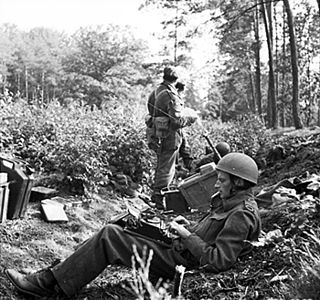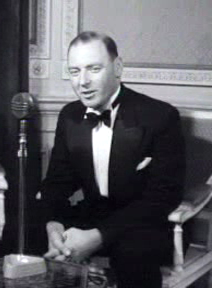
The Atlantic Wall was an extensive system of coastal defences and fortifications built by Nazi Germany between 1942 and 1944 along the coast of continental Europe and Scandinavia as a defence against an anticipated Allied invasion of Nazi-occupied Europe from the United Kingdom, during World War II. The manning and operation of the Atlantic Wall was administratively overseen by the German Army, with some support from Luftwaffe ground forces. The Kriegsmarine maintained a separate coastal defence network, organised into a number of sea defence zones.

The Normandy landings were the landing operations and associated airborne operations on 6 June 1944 of the Allied invasion of Normandy in Operation Overlord during the Second World War. Codenamed Operation Neptune and often referred to as D-Day, it is the largest seaborne invasion in history. The operation began the liberation of France, and the rest of Western Europe, and laid the foundations of the Allied victory on the Western Front.

The Commandos, also known as the British Commandos, were formed during the Second World War in June 1940, following a request from Winston Churchill, for special forces that could carry out raids against German-occupied Europe. Initially drawn from within the British Army from soldiers who volunteered for the Special Service Brigade, the Commandos' ranks would eventually be filled by members of all branches of the British Armed Forces and a number of foreign volunteers from German-occupied countries. By the end of the war 25,000 men had passed through the Commando course at Achnacarry. This total includes not only the British volunteers, but volunteers from Greece, France, Belgium, Netherlands, Canada, Norway and Poland. The United States Army Rangers and US Marine Corps Raiders, Portuguese Fuzileiros Portuguese Marine Corps were modelled on the Commandos.

Operation Jubilee or the Dieppe Raid was a disastrous Allied amphibious attack on the German-occupied port of Dieppe in northern France, during the Second World War. Over 6,050 infantry, predominantly Canadian, supported by a regiment of tanks, were put ashore from a naval force operating under the protection of Royal Air Force (RAF) fighters.

A war correspondent is a journalist who covers stories first-hand from a war zone.

Lieutenant Colonel Robert Blair Mayne,, better known as Paddy Mayne, was a British Army officer from Newtownards, capped for Ireland and the British and Irish Lions at rugby union, lawyer, amateur boxer, and a founding member of the Special Air Service (SAS).
The Canadian Global Affairs Institute (CGAI) is an independent, non-partisan research institute based in Calgary with an office in Ottawa. Incorporated as a charitable organization in 2001, CGAI seeks to focus the national debate and understanding of Canada's international policies, with the ultimate aim of ensuring a more globally engaged Canada.

The New Guinea campaign of the Pacific War lasted from January 1942 until the end of the war in August 1945. During the initial phase in early 1942, the Empire of Japan invaded the Territory of New Guinea on 23 January and Territory of Papua on 21 July and overran western New Guinea beginning on 29 March. During the second phase, lasting from late 1942 until the Japanese surrender, the Allies—consisting primarily of Australian forces—cleared the Japanese first from Papua, then New Guinea, and finally from the Dutch colony.

Colonel Charles Perry Stacey was a Canadian historian and university professor. He served as the official historian of the Canadian Army in the Second World War and published extensively on military and political matters.
Brian Edward Stewart, is a Canadian journalist. Stewart is best known for his news reports and documentary features as senior correspondent of the Canadian Broadcasting Corporation's (CBC) flagship news hour, The National, where he worked for over two decades.

40 Commando RM is a battalion-sized formation of the British Royal Marines and subordinate unit within 3 Commando Brigade, the principal Commando formation, under the Operational Command of Commander in Chief Fleet. Their barracks are at Norton Manor Camp, Norton Fitzwarren near Taunton in Somerset.

Operation Overlord was the codename for the Battle of Normandy, the Allied operation that launched the successful liberation of German-occupied Western Europe during World War II. The operation was launched on 6 June 1944 (D-Day) with the Normandy landings. A 1,200-plane airborne assault preceded an amphibious assault involving more than 5,000 vessels. Nearly 160,000 troops crossed the English Channel on 6 June, and more than two million Allied troops were in France by the end of August.

Charles Burchill Lynch, was a Canadian journalist and author.

D-Day the Sixth of June is a 1956 American DeLuxe Color CinemaScope romance war film made by 20th Century Fox. It was directed by Henry Koster and produced by Charles Brackett from a screenplay by Ivan Moffat and Harry Brown, based on the 1955 novel, The Sixth of June by Lionel Shapiro. The film stars Robert Taylor, Richard Todd, Dana Wynter, and Edmond O'Brien.

Operation Astonia was the codename for an Allied attack on the German-held Channel port of Le Havre in France, during the Second World War. The city had been declared a Festung (fortress) by Hitler, to be held to the last man. Fought from 10 to 12 September 1944, the Allied objective was to secure the harbour facilities intact, to deliver supplies to the Allied armies in Continental Europe. The Allies refused to let the civilian population be evacuated, despite offers of free passage by the fortress commander.

Francis George Gillard was a BBC executive, reporter and radio innovator.

The Australian contribution to the Battle of Normandy involved more than 3,000 military personnel serving under British command. The majority of these personnel were members of the Royal Australian Air Force (RAAF), though smaller numbers of Australians serving with the Royal Navy and British Army also participated in the fighting prior to and after the Allied landings on 6 June 1944. While all the RAAF units based in the United Kingdom (UK) took part in the battle, Australians made up only a small portion of the Allied force.
Don Whitehead was an American journalist. He was awarded the Medal of Freedom. He won the 1950 George Polk Award for wire service reporting.

Break-through is an 11-minute 1944 Canadian documentary film, made by the National Film Board of Canada (NFB) as part of the wartime Canada Carries On series. The film documents the attack on Fortress Europe during the Second World War and the advance of Allied forces to the borders of Nazi Germany. Break-through was produced by James Beveridge. The film's French version title is L'assaut.
















